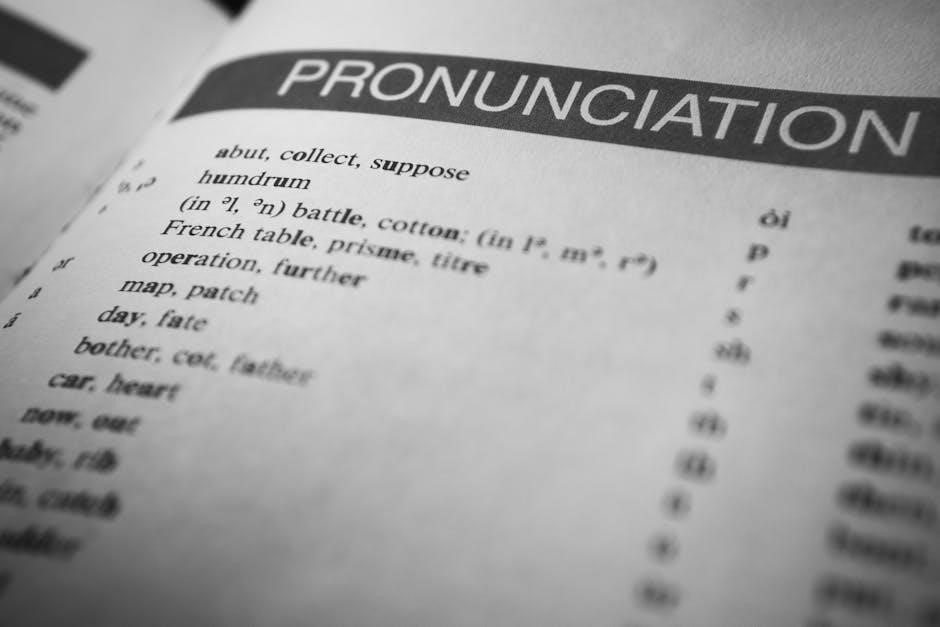english language revision guide aqa
This guide provides a comprehensive resource for students preparing for the AQA GCSE English Language exams, covering key components and strategies for success in both Paper 1 and Paper 2.
With detailed overviews, expert tips, and practice questions, it equips learners with the skills and confidence needed to excel in reading, writing, and language analysis tasks.
1.1 Overview of the AQA GCSE English Language Course
The AQA GCSE English Language course is designed to develop essential skills in reading, writing, and language analysis. It is divided into two papers, each assessing different aspects of linguistic competence. Paper 1 focuses on fiction texts, while Paper 2 covers non-fiction and creative writing. The course emphasizes critical thinking, analytical skills, and the ability to articulate ideas clearly.
Students engage with a variety of texts, including 19th- and 20th-century fiction, contemporary non-fiction, and unseen materials. The curriculum also includes the study of literary devices and language techniques, preparing students for both exams and real-world communication challenges.
1.2 Importance of Revision for Exam Success
Revision is a cornerstone of achieving success in the AQA GCSE English Language exams. It helps students develop a deep understanding of the course content, identify weaknesses, and refine their skills in reading, writing, and language analysis. Regular revision ensures familiarity with exam formats, question types, and timing, reducing anxiety on exam day.
By revisiting key texts, literary devices, and writing techniques, students can build confidence and improve their ability to articulate ideas clearly. Effective revision strategies, such as practicing past papers and using revision guides, enable learners to approach the exams with a well-prepared mindset and maximize their potential for achieving high grades.
Paper 1: Exploring the Key Components
Paper 1 focuses on reading comprehension, language analysis, and textual exploration, featuring various question types to assess analytical and interpretative skills.
2.1 Paper 1: Section A Overview
Section A of Paper 1 focuses on reading comprehension and language analysis. Students are provided with an unseen extract and must answer questions that test their ability to identify and analyze literary techniques, as well as understand the writer’s intent.
Questions typically include identifying language devices, explaining their effects, and analyzing how the writer conveys themes or perspectives. The extract is printed in the exam booklet, so students do not need to memorize texts in advance.
This section assesses close reading skills, requiring students to support their answers with textual evidence. Effective analysis and clear, concise writing are key to achieving high marks in this part of the exam.
2.2 Paper 1: Section B Overview
Section B of Paper 1 focuses on text production, requiring students to write a descriptive or narrative text based on a given prompt or image. This section assesses writing skills, creativity, and the ability to engage the reader.
Students must ensure their writing is clear, coherent, and tailored to the specified audience and purpose. Marks are awarded for vocabulary, grammar, sentence structure, and the effective use of literary devices to convey meaning.
Practice in crafting compelling introductions and conclusions, as well as maintaining a consistent tone, is essential for success in this section. Understanding the question and planning the response thoroughly are key strategies for achieving high marks.
2.3 Key Question Types for Paper 1

Paper 1 features a range of question types designed to test reading comprehension, language analysis, and writing skills. In Section A, students typically encounter multiple-choice questions and short-answer responses focused on extracting information and analyzing language techniques.
In Section B, the focus shifts to text production, with questions prompting students to write descriptive or narrative texts based on visual or thematic stimuli. Additionally, there are questions requiring the identification of literary devices and the exploration of their effects.
Practicing these question types helps students develop the necessary skills to approach each part of the paper with confidence and precision, ensuring they can effectively demonstrate their understanding and abilities.

Paper 2: Mastering the Reading and Writing Skills
This section focuses on refining reading comprehension and writing techniques, essential for excelling in AQA GCSE English Language Paper 2. It covers strategies for analyzing texts and crafting structured responses.
3.1 Paper 2: Section A Overview
Section A of Paper 2 focuses on reading comprehension, requiring students to analyze and interpret a variety of texts, including fiction and non-fiction extracts. Questions assess the ability to identify themes, tones, and literary devices, as well as to explore the writer’s intent. Students must demonstrate close reading skills, providing evidence-based answers. The section also includes language analysis, where applicants discuss vocabulary, syntax, and stylistic choices. Effective preparation involves practicing with past papers and refining essay structure. Understanding question requirements is crucial for achieving high marks in this component of the AQA GCSE English Language exam.
3.2 Paper 2: Section B Overview
Section B of Paper 2 focuses on writing tasks, where students are required to produce clear, coherent, and well-structured texts. Questions may ask for transactional writing, such as letters or speeches, or descriptive and narrative writing. Students must demonstrate their ability to adapt tone, style, and language to suit the purpose and audience. The section assesses spelling, punctuation, grammar, and the ability to convey ideas effectively. Practicing different writing styles and planning responses thoroughly is essential for success. The mark scheme emphasizes clarity, organization, and the appropriate use of vocabulary and sentence structures.
3.3 Strategies for Tackling Paper 2 Questions
To excel in Paper 2, focus on skimming and scanning techniques to quickly identify key points in texts. For Section A, highlight unfamiliar vocabulary and analyze language techniques explicitly. In Section B, plan your writing thoroughly, ensuring a clear structure and appropriate tone. Practice timing yourself to avoid running out of time. Regularly review model answers to understand examiners’ expectations. Use active reading strategies, such as annotating texts, to engage deeply with the content. Finally, prioritize grammar, spelling, and punctuation to maximize marks in both sections.

Literary Devices and Language Analysis
Mastering literary devices and language analysis is crucial for interpreting texts effectively. Understanding techniques like metaphor and imagery enhances comprehension and supports exam success.
4.1 Identifying and Analyzing Literary Techniques
Identifying literary techniques is essential for analyzing texts effectively in AQA GCSE English Language exams. Techniques like simile, metaphor, and personification are commonly used to convey meaning. Students should practice recognizing these devices in extracts and understand their impact on the reader. Analysis should explain how the technique contributes to the overall tone or theme. For example, a simile might highlight a character’s emotions, while imagery could create vivid scenes. Regular practice with past papers and revision guides helps build confidence in identifying and interpreting these techniques accurately. This skill is vital for achieving high marks in both Paper 1 and Paper 2.
4.2 Effective Language Analysis for Extracts
Effective language analysis involves closely examining how authors use language to convey meaning. Focus on identifying tone, word choice, and sentence structure. Analyze how these elements create specific effects or emphasize themes. Use evidence from the text to support your analysis, explaining the impact of language on the reader. Practice identifying literary devices and their purposes. Regularly reviewing extracts and practicing analysis will enhance your ability to interpret texts confidently. This skill is crucial for achieving top marks in both Paper 1 and Paper 2, as it demonstrates a deep understanding of the writer’s intentions and techniques.

Revision Strategies and Tips
Creating a structured timetable and using active techniques like flashcards and practice questions can enhance retention and understanding of key concepts for AQA GCSE English Language exams.
5.1 Creating a Revision Timetable
Organizing your study schedule with a detailed revision timetable is essential for effective preparation. Start by identifying key topics and allocating specific time slots for each, ensuring a balanced approach between reading, writing, and language analysis. Set clear, achievable goals for each study session and incorporate regular breaks to maintain focus. Prioritize weaker areas and use past papers to simulate exam conditions. Regularly review and adjust your timetable to track progress and stay motivated. Consistency is key, so stick to your plan and avoid last-minute cramming. A well-structured timetable will help you cover all aspects of the AQA GCSE English Language curriculum efficiently.
5.2 Active Revision Techniques for Better Retention

Engage with your studies through active revision techniques to enhance memory retention. Summarize key points in your own words, create concept maps, and use flashcards to reinforce vocabulary and concepts. Practice past papers actively by explaining your thought process aloud or teaching the material to someone else. Incorporate multimedia, such as videos or audio recordings, to diversify your learning. Regular self-quizzing and spaced repetition can also strengthen long-term retention. By applying these methods, you’ll stay engaged, reduce passive learning, and build a deeper understanding of the AQA GCSE English Language curriculum, ensuring better preparation for exam success.

Additional Resources for AQA GCSE English Language
Enhance your revision with recommended books like CGP’s Revision Guide and Collins Snap Revision. Utilize online resources, including BBC Bitesize, for practice questions, videos, and interactive activities.
6.1 Recommended Revision Guides and Books
CGP’s AQA GCSE English Language Revision Guide is a top choice, offering clear explanations and practice questions for both Papers 1 and 2. Collins Snap Revision provides concise summaries and focused analysis, ideal for last-minute preparation. Both resources align with the AQA specification, ensuring comprehensive coverage of reading and writing skills. Additionally, these guides include expert tips on language analysis and literary techniques, helping students refine their exam strategies. They are designed to build confidence and understanding, making them essential companions for successful revision. These books are widely recommended for their clarity and effectiveness in supporting students through their GCSE journey.
6.2 Online Resources and Practice Materials
Online resources are invaluable for AQA GCSE English Language revision. BBC Bitesize offers comprehensive study guides, video tutorials, and practice quizzes tailored to the AQA specification. Additionally, AQA’s official website provides past papers, mark schemes, and sample answers, enabling students to familiarize themselves with exam formats. Revision websites like Seneca Learning and Quizlet also offer interactive activities and flashcards to reinforce key concepts. These digital tools complement traditional revision guides, offering flexible and engaging ways to practice reading, writing, and language analysis skills. Utilizing these resources ensures students are well-prepared for both Papers 1 and 2, enhancing their confidence and exam performance.
Effective revision and strategic preparation are key to achieving success in AQA GCSE English Language. Stay confident, review thoroughly, and ensure a final check of all materials before the exam.
7.1 Summarizing Key Points for Last-Minute Revision
For last-minute revision, focus on key areas: question types, literary devices, and text analysis. Prioritize understanding exam structures and practicing timed responses. Use flashcards for quick recall of terminology and techniques. Review model answers to refine your writing style and ensure clarity. Allocate time to revisit weak areas identified during practice. Utilize concise revision guides like CGP’s for targeted learning. Engage with online resources such as BBC Bitesize for interactive quizzes. Skim through notes to reinforce memory rather than rereading extensively. Stay calm and systematic to maximize retention and performance in the final exam.
7.2 Building Confidence for the Exam Day
Building confidence for the AQA GCSE English Language exam involves thorough preparation and a positive mindset. Ensure you are familiar with the exam format and timing to reduce anxiety. Practice past papers under timed conditions to simulate exam-day pressure. Focus on strengths while addressing weaker areas with targeted revision. A well-rested mind and a healthy lifestyle in the lead-up to the exam will enhance clarity and focus. Arrive early at the exam venue to avoid last-minute stress. Remind yourself of past achievements and stay calm—confidence comes from knowing you’ve prepared thoroughly. Positive affirmations and a growth mindset will help you approach the exam with assurance and resilience.


